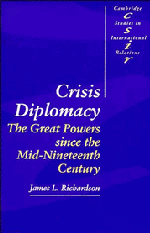Book contents
- Frontmatter
- Contents
- List of tables
- Acknowledgments
- I PART I
- PART II
- PART III
- 10 Crises and the international system: arenas, alignments and norms
- 11 The choice of goals: values, interests and objectives
- 12 Selective perception and misperception
- 13 Crisis bargaining
- 14 Internal politics
- 15 The outcome and the risk of war
- PART IV
- Notes
- Select bibliography
- Index
- CAMBRIDGE STUDIES IN INTERNATIONAL RELATIONS
14 - Internal politics
Published online by Cambridge University Press: 03 May 2011
- Frontmatter
- Contents
- List of tables
- Acknowledgments
- I PART I
- PART II
- PART III
- 10 Crises and the international system: arenas, alignments and norms
- 11 The choice of goals: values, interests and objectives
- 12 Selective perception and misperception
- 13 Crisis bargaining
- 14 Internal politics
- 15 The outcome and the risk of war
- PART IV
- Notes
- Select bibliography
- Index
- CAMBRIDGE STUDIES IN INTERNATIONAL RELATIONS
Summary
It is evident from the case studies and from the preceding chapters that the ‘black box’ of internal politics provides the key to resolving many otherwise puzzling aspects of the cases. The goals of the actors' foreign policies depend on the power structures which sustain their rulers. Governmental stability or instability affect the capacity to respond to crises: internal politics impinge on governments' ability to pursue coherent objectives, to confront difficult choices and to bargain effectively, and can generate processes which make for the uncontrolled escalation of crises (the hostility spiral). The processes for resolving differences among decision makers vary in accordance with differing political institutions, but their effectiveness is also influenced by the level of internal political tensions.
The most dramatic changes in a state's foreign policy goals result from changes of political regime: from France under the ancien régime to the revolution and Empire, for example, or from Germany under the Weimar Republic to Nazism. But as the case studies have shown repeatedly, foreign policy objectives differ even between relatively like-minded decision makers: Palmerston and Aberdeen, or Kiderlen and the Kaiser. The institutions and political processes which determine who rules are major ‘givens’ in the case studies: they also determine whose goals will be pursued, whether their rule is stable or contested, and so forth. If explanations are sought for these ‘givens’, it must be in the political histories of each state, broadly understood.
- Type
- Chapter
- Information
- Crisis DiplomacyThe Great Powers since the Mid-Nineteenth Century, pp. 306 - 326Publisher: Cambridge University PressPrint publication year: 1994

